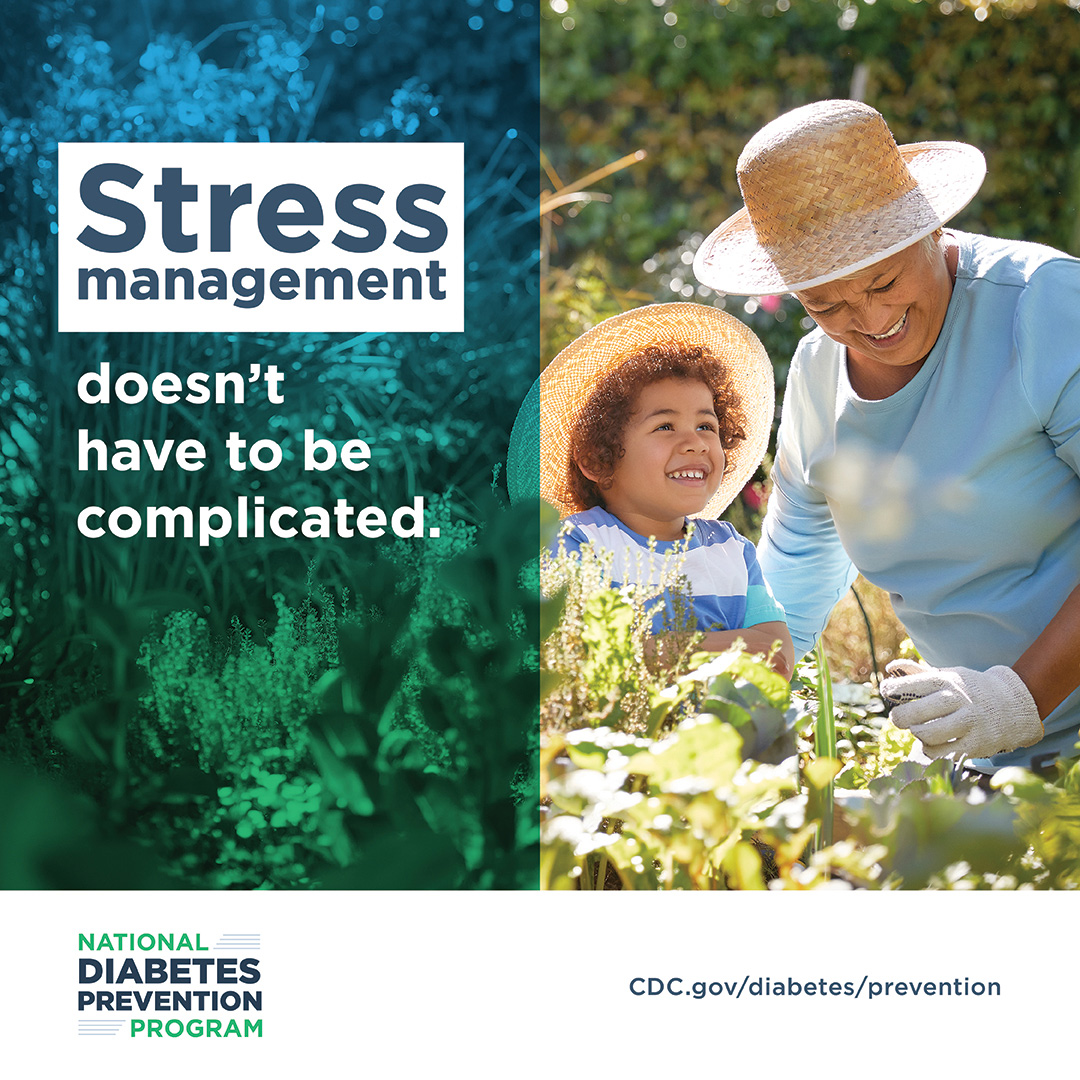 Today, our world is all about multitasking. Between work, family obligations, hobbies, and everyday responsibilities, it’s easy to feel maxed out and stressed. This may seem like a normal part of life. But did you know that stress could be impacting your risk for type 2 diabetes and other health conditions? April is Stress Awareness Month – the perfect time to reflect on how you manage stress in your life.
Today, our world is all about multitasking. Between work, family obligations, hobbies, and everyday responsibilities, it’s easy to feel maxed out and stressed. This may seem like a normal part of life. But did you know that stress could be impacting your risk for type 2 diabetes and other health conditions? April is Stress Awareness Month – the perfect time to reflect on how you manage stress in your life.
National Diabetes Prevention Program (National DPP) lifestyle coach Jillian Miner likes to present the topic of stress this way: Imagine that you’re a caveman being chased by a saber tooth tiger. Your survival response kicks in, and your body needs a quick energy boost to support that adrenaline rush. When you experience stress, an easy solution appears to be sugar – a quick fuel to get you through. This is why you tend to crave sugary snacks in stressful moments or turn to “stress eating” to feel better.
A small bit of sugar may not be a problem for a caveman fleeing for his life. Today, however, . Your body has to find a way to cope with the stressors thrown your way, and sugary foods are often many people’s go-to. This type of snacking in turn increases your blood sugar levels, your chances of having prediabetes, and your risk of developing type 2 diabetes. So, what’s the alternative?
CYL2 and Stress Management
The CDC-led National DPP lifestyle change program recognizes the importance of stress management and how effective tools for managing stress help reduce your risk of developing type 2 diabetes. Here at Whatley Health Services, we’ll connect you with other program participants who can relate to your challenges and lifestyle coaches who can support your health journey.

Lifestyle coach Jillian uses exercise and getting outside as outlets for stress.
For Jillian, this means offering her participants a “buffet of stress management options,” suggesting various activities so they can determine which will work for them. Managing your stress doesn’t have to be an unattainable goal, but instead, can be about making time for the activities you already know refresh you. She says her goal is to get participants to “consider stress management in a different way. It’s about finding creative ways to reduce stress.”
Some of Jillian’s top tips for managing stress include the following:
- Think about what refreshes you. It can be any activity (besides eating), as long as it’s something that what will help you relax. Try making a list of all the activities that you find reduce your stress.
- Be intentional with your rest. Decide when you are going to take a break to reset. To make sure you do, set a timer or add a reminder to your calendar.
- Get outside. Take a hike or simply go outdoors to enjoy some fresh air.
- Get moving. Get your heart pumping with dance or physical activity to release pent up stress. You can also try going for a walk or stretching.
- Get organized. Sometimes writing out a to-do list, cleaning up a messy space, or organizing a junk drawer can clear your head.
- Do a brain dump. Grab a piece of paper and write out everything that’s floating around in your mind to make room for calmer thoughts.
Support When You Need It Most
With these approaches in mind, it’s possible to find pauses in your day to minimize stress without turning to food for comfort. Techniques like these will not only help you feel better emotionally, but they’ll support you in your efforts to live a healthier life overall.
To explain the benefits of the National DPP lifestyle change program, Jillian says, “The lifestyle change program isn’t about just teaching you things – everyone already has an idea of stuff that is healthy. The magic is in making healthy habits. The program helps you make healthier choices on a daily basis.”
With the help of lifestyle coaches like Jillian, some of those choices can lead to better stress management – and ultimately, a healthier lifestyle. Through the program, you can receive support in following through on the habits that help you to reduce stress.
Want to know how you can get involved and learn more about managing stress and reducing your risk of developing type 2 diabetes? Visit https://whatleyhealth.org/cyl2/ for more information.
